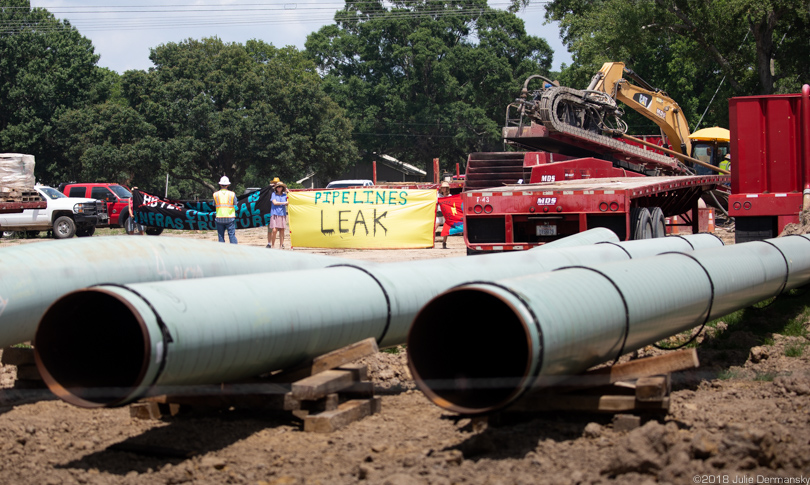Today, residents of St. James, Louisiana, and groups opposing the Bayou Bridge pipeline petitioned a state court to halt construction on the oil pipeline along its final 18 miles. This segment falls in an area known as the coastal zone and requires a special state permit.
The court previously ruled against the Louisiana Department of Natural Resources (DNR) for issuing a permit that did not follow state guidelines and consider if the project had adequate environmental and emergency response plans for the town of St. James in case of a pipeline failure.
Opponents thought the court’s order would bring a stop to construction but that hasn’t been the case. As a result, today’s petition asks for a pause in construction until all the permit’s conditions are met.
The pipeline company, Bayou Bridge Pipeline LLC, is a joint venture of Energy Transfer Partners (owner of the Dakota Access pipeline) and Phillips 66. If completed as planned, Energy Transfer Partners estimates that the 162.5-mile pipeline will move “480,000 barrels per day of light and heavy crude oil from different sources to the St. James crude oil hub, which is home to important refineries located in the Gulf Coast region.” St. James would be the end of an oil pipeline network that begins with Dakota Access far to the north.
Despite Judge Alvin Turner, Jr.’s decision, construction has continued on the Bayou Bridge pipeline. Even as residents of St. James, a primarily low-income, African-American community, have called for pipeline work in their rapidly industrializing town to stop, some say it instead has intensified in pace since the ruling.
Ongoing work on the Bayou Bridge pipeline in St. James, near Burton Lane.
On May 22, DNR appealed the court’s earlier finding that the coastal zone permit was invalid. The agency’s appeal says it disagrees with the court’s decision, first made on April 30 and followed by a formal judgment on May 15.
When asked why DNR had not halted work after the court first ruled against it, the agency previously told DeSmog that the law prevented it from doing so until either DNR had filed for an appeal or the 30-day window for appealing ended.
However, Lisa Jordan, a lead attorney with the Tulane Environmental Law Clinic, representing St. James Pastor Harry Joseph, the Gulf Restoration Network, Atchafalaya Basinkeeper, and H.E.L.P. (Humanitarian Enterprise of Loving People), doesn’t agree. She is astounded the company didn’t stop work after the April 30 ruling.
Today Jordan petitioned the court to issue a stay, which should stop work on the pipeline, even if the court grants the state its appeal. Her motion argues that allowing construction to continue before DNR brings the permit into compliance places the community at risk. The pipeline could possibly be in the ground and “transporting oil, including potentially bitumen” [tar sands oil], before an appeal is heard, she argues, leaving the people of St. James, a small town along the Mississippi River with only a single road leading out, with no way to evacuate if a pipeline accident blocks their one exit.
Bayou Bridge pipeline construction continues in St. James, which falls in the coastal zone of Louisiana and requires a special permit from the state.
“We feel our staff did their jobs the right way … in issuing the permits,” DNR told NOLA.com.
A spokeswoman for Energy Transfer Partners told NOLA.com that the pipeline is being built in accordance with state and federal permits.
“Our construction activities have been and will continue to adhere to the stipulations of our permits,” Alexis Daniel said. “Our commitment to the safe construction and operation of this pipeline remains unchanged.”
But critics of Energy Transfer Partners continue to clash with the company over multiple pipelines in Louisiana and beyond. “Across the country, Energy Transfer Partners (ETP) acts as if it’s above the law, and government lets it get away with it,” Ethan Buckner, energy campaigner with Earthworks, said in a press release today. “ETP violates permits, ignores agency orders, inflicts violence upon protesters, and, most recently, openly defies court orders. Consequently, the public has to directly hold this company to account, and we will continue to do so.”
Protests at Pipeline Construction Sites
This morning, over a dozen environmental activists occupied a pipeline construction site in St. James Parish, which is part of the coastal zone. They delivered a copy of the court’s order to the workers and the police who arrived and asked them to disperse. Two protesters refused to leave and were arrested for trespassing but released not long after.
“St. James residents haven’t been listened to,” Alicia Cooke of 350 New Orleans said in a press statement following her release from jail. “We’ve been fighting this pipeline on every level through every legal means for over a year. I’m not sure how many more ways Louisianans can say we don’t want this or need this. Our bodies are on the line, because that’s all we have left.”
The action today at the pipeline construction site included members of the Louisiana Bucket Brigade, 350 New Orleans, and the anti-pipeline L’eau Est La Vie (Water Is Life) Camp. They began engaging in direct actions at Bayou Bridge construction sites soon after pipeline building started this year. They say their actions are meant to stop the construction, if only for a couple hours, and raise awareness about the damage not only oil pipelines cause but the fossil fuel industry in general.
These activists, who call themselves water protectors, also have been monitoring pipeline construction sites across Louisiana and documenting what they allege are permit violations, which they report to the appropriate agencies.
Legal Battles Continue in Federal and State Courts
Dean Wilson, executive director of the environmental nonprofit Atchafalaya Basinkeeper, is a plaintiff in the state lawsuit as well as in a federal suit challenging a U.S. Army Corp of Engineers permit allowing the same pipeline to cut through the Atchafalaya Basin, a National Heritage Area. He believes the company’s decision to construct the pipeline despite ongoing litigation is telling. “This shows the regulatory agencies are controlled by the corporations they are supposed to regulate,” Wilson told me.
He stressed that his organization isn’t “against the oil and gas industry. We are against the oil and gas industry breaking laws that protect the environment.”
Dean Wilson in the Atchafalaya Basin on Jan 15, 2018, in front of a cypress tree in the proposed path of the Bayou Bridge pipeline that has since been cut down.
Though Wilson says it is discouraging that even recent court victories haven’t stopped the building of the pipeline, he hasn’t given up on the justice system yet because too much is at risk. He is glad that the court challenges have made more people aware of the issues facing the state. “If laws to protect the state aren’t followed, the Louisiana coast and the Atchafalaya are at risk.”
A recent report by Greenpeace and Waterkeeper Alliance showed that Energy Transfer Partners averages an accident or oil spill every 11 days. Wilson said that the report is a reminder that the concerns of his organization are well founded. “We need our regulators to enforce laws meant to protect us all.”
In Jordan’s motion filed today she cited another case in which the court ruled “there is a strong public interest in requiring a government agency to follow its own rules and regulations.” The motion states that because “DNR illegally failed to address issues critical to public safety,” the judge should issue a stay that would force DNR to address those issues, namely that the agency and pipeline company establish an effective emergency and evacuation plan for St. James before building can continue construction in the costal zone.
Tomorrow the judge is expected to set a date for hearings on DNR’s motion to appeal and the opponents’ request to pause construction, according to Jordan.
“Our position is the same: [Bayou Bridge Pipeline LCC] is operating under an illegal permit, which means it has no permit,” Jordan said in an email. “Regardless of what legal argument the agency comes up with, the bottom line is that it’s their job to enforce the law, and that includes orders issued by the judicial branch of the government.”
Main image: Protesters shut down a Bayou Bridge pipeline construction site in Maurice, Louisiana, on May 12, 2018. Credit: Julie Dermansky ©2018
Subscribe to our newsletter
Stay up to date with DeSmog news and alerts










